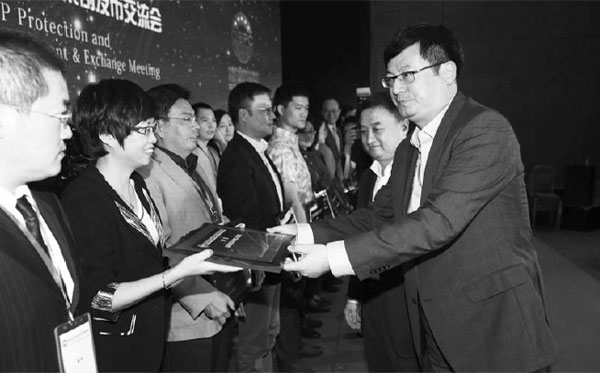Protection system should be fair, strict and innovative: QBPC
|
Enforcement authorities involved in model cases win plaques of gratitude from the QBPC. Provided to China Daily |

Intellectual property right owners need a protection system that is fair, strict and innovative, said Chen Xiaodong, chairman of the Quality Brands Protection Committee of the China Association of Enterprises with Foreign Investment.
He was speaking at a news conference on May 12 to announce the 2015-16 annual top 10 practice cases in IP protection and model cases bridging administrative and judicial IP enforcement.
He said international companies' Chinese divisions should enjoy the same status as Chinese companies in terms of IP protection, and companies from different countries and regions should be treated equally in the market.
In addition, the protection should be "timeproof and predictable", and not be influenced by changes in international economic conditions or the relationships between countries.
"Strict protection means strict legal systems and regulations plus strict enforcement," Chen said. He suggested expanding the range of IP crimes and increasing punishments for IP infringements, and called for effective cooperation between administrative and judicial IP enforcement.
He also said traditional investigation methods and protection modes are facing unprecedented difficulties, as counterfeiting infiltrates into smaller cities and the countryside and the internet offers new challenges. He suggested authorities combine their efforts using multiple regulations to increase their abilities to deter IP violations.
Zhang Jingli, deputy director at the economic crime investigation bureau of the Ministry of Public Security, agreed, saying the police and other administrations have to cooperate now and in the near future to deal with IP challenges.
"Although we have had rampant IP crimes in check, the elements that nurture IP violations still exist," he said, adding that selling counterfeits via the internet has become a typical long-distance noncontact crime model, leading to increasing numbers of cross-regional and international crimes.
Since 2011, Chinese police have tackled more than 170,000 cases about counterfeits and IP violation, at a value of more than 100 billion yuan ($15.3 billion).
He said the police will never stop fighting against IP crimes, with a focus on those emerging types of counterfeiting that endanger production safety and people's health, discourage innovation and have negative impacts on China's international image.
He also called on police nationwide to use high-tech methods.
The QBPC started the annual top 10 practice cases campaign in 2002 and the model cases bridging administrative and judicial IP enforcement in 2012.
This year, the cases selected have covered areas including machinery, electrics, medicines, daily commodities and clothing.
"Through these cases, we have seen that the judicial and administrative departments have cooperated closely to protect the interests of IP right owners and consumers," said the QBPC chairman.
zhangzhao@chinadaily.com.cn

(China Daily 05/18/2016 page17)













